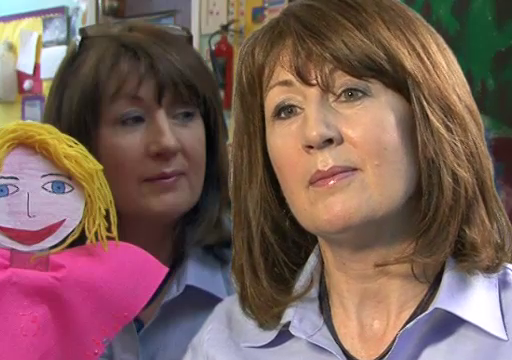4 Learning lives in the primary school
In the video that you will watch in a moment, the following six people talk about how they came to be in their roles in a primary school and how they continue to learn 'on the job':
- Vicky, a teaching assistant who is also training to be an occupational therapist
- Tina, a higher level teaching assistant (HLTA), who began working in the primary school after her own children had started school
- Jean, a pupil support assistant, who also began work in a school after being a full-time mum for many years
- Hugh, a grandparent and retired police janitor, who helps with Primary 1 children, especially the younger children who sometimes require a bit more support
- Lucy, a teaching assistant who used to work in a supply capacity in schools, often having to learn on the spot
- Pam, a volunteer parent studying for a teaching assistant certificate and with a particular interest in special needs.
Activity _unit9.4.1 Activity 1 Different starting points for learning
As you watch and listen to these six people talk about their backgrounds and their learning lives, think about the questions that follow.

Transcript: Video 2
- What kinds of formal learning can you identify in the teaching assistants’ comments?
- What kinds of informal learning can you identify?
- What knowledge, skills and understanding have the teaching assistants developed through formal and informal learning?
- How do the teaching assistants apply their learning to their current jobs in the schools?
- How are they continuing to learn in their workplaces? What knowledge, skills and understanding are they developing in their current roles?
- Linking to the reading you did earlier about Anne and the Learning Lives project, can you identify how each of the teaching assistants creates a ‘story’ about her or his learning?
Discussion
The six people who work and volunteer in the primary school all had different starting points as learners. Some had formal academic qualifications or training when they began to work in the primary school – sometimes from quite different professions to primary school education. Others learned informally, at home or in the community. They draw on the skills and knowledge they developed in other walks of life and bring these to the primary school. Crucially, they all have an interest in children’s learning and development. They use this interest to reflect on their own learning, attitudes and behaviour as adults.
As they work alongside children and other professional adults, they develop skills in observation, sensitive listening, and knowing when and how much to intervene. They get to know children well, and this knowledge enables them to provide appropriate levels of support for children’s individual needs. They are developing knowledge of curriculum subjects like maths and literacy. They are also developing ‘soft’ skills for communication, team working and collaboration.
They can all describe their ‘story’ as adult learners, identifying where and how they learned and how they made decisions as learners. All this helps them to work in a productive and professional way with other adults and with children.
